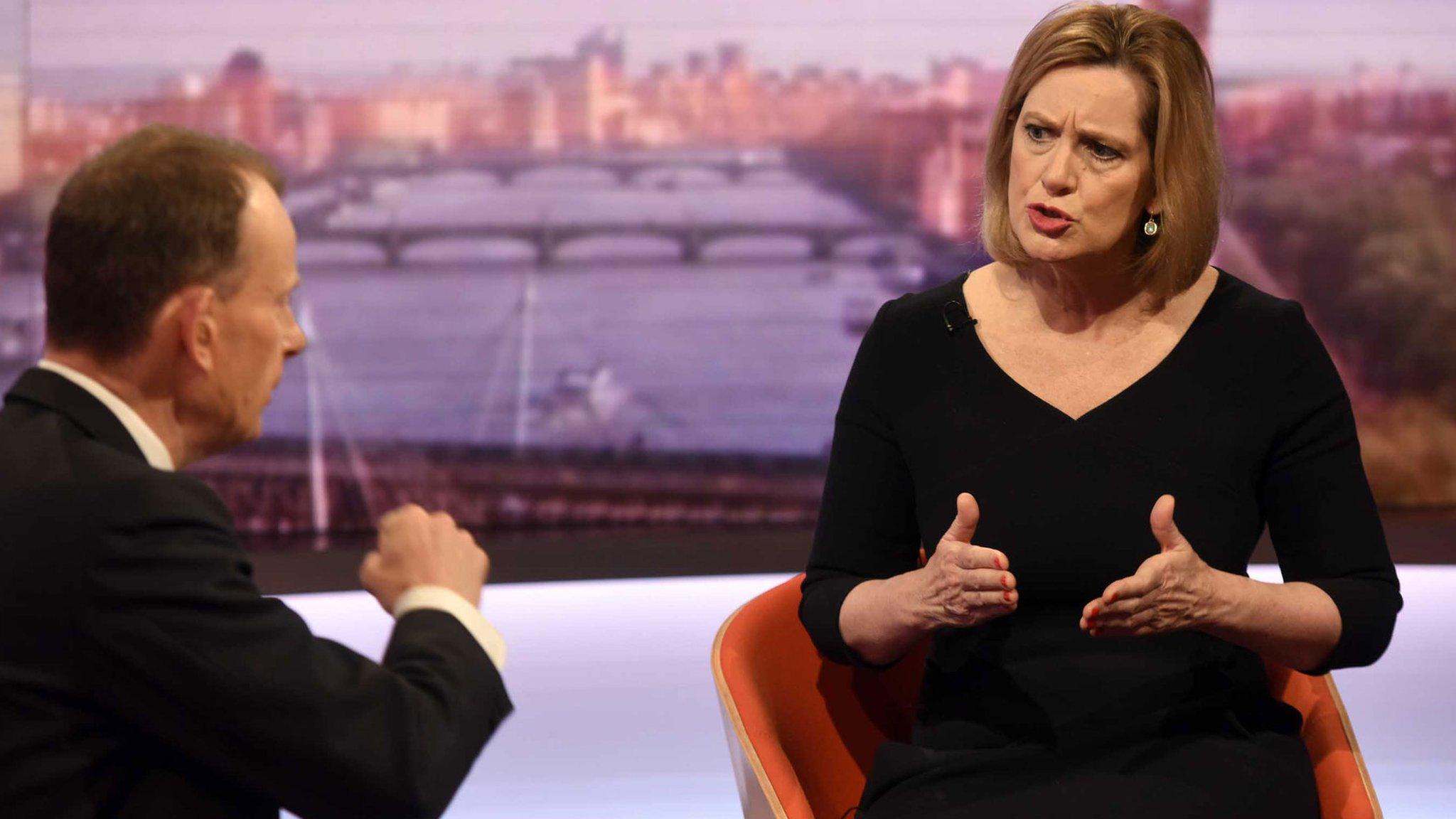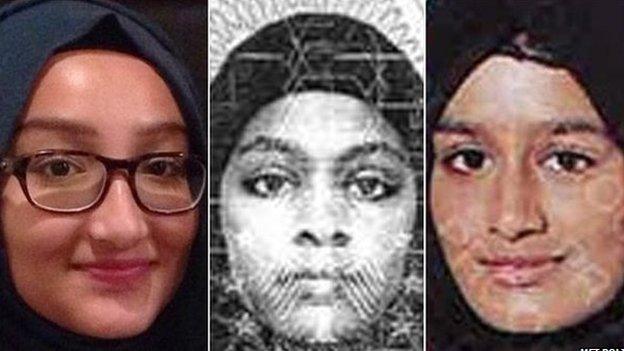New counter-extremism tsar Sara Khan faces calls to quit
- Published
Sara Khan: 'I'm not a Home Office mouthpiece'
The head of Theresa May's new anti-extremism commission - set up after the Manchester Arena attack - is facing calls to quit from Muslim groups.
Sara Khan, who has campaigned for women's rights in Muslim communities, has been given the task of rooting out extremism in the UK.
She has promised "zero tolerance to those who promote hate".
But her support for the Home Office's Prevent strategy has led to claims she is too close to the government.
Downing Street has insisted Ms Khan is "expertly qualified" for the new role - but a number of Muslim organisations are understood to be calling for her to be sacked and saying they will not work with her.
A petition by anti-Islamophobia campaign MEND, saying her appointment "will further damage relations between the government and Muslim communities," is being circulated, the BBC understands.
Lady Warsi, the first Muslim woman to serve as a British cabinet minister, said many British Muslims saw Ms Khan as a "mouthpiece" of ministers.
The Conservative peer questioned Ms Khan's likely independence as the Commissioner for Countering Extremism in a series of tweets and warned of "destructive and dangerous games" being played.
Allow X content?
This article contains content provided by X. We ask for your permission before anything is loaded, as they may be using cookies and other technologies. You may want to read X’s cookie policy, external and privacy policy, external before accepting. To view this content choose ‘accept and continue’.
Allow X content?
This article contains content provided by X. We ask for your permission before anything is loaded, as they may be using cookies and other technologies. You may want to read X’s cookie policy, external and privacy policy, external before accepting. To view this content choose ‘accept and continue’.
Harun Khan, secretary general of the Muslim Council of Britain, said: "The fight against terrorism requires equal partnership between all parties, including Muslim communities.
"This appointment risks sending a clear and alarming message that the government has no intention of doing so."
Ms Khan's work in schools and community groups, through her Inspire charity, was praised by then Home Secretary Theresa May, who joined the Sun newspaper in backing her 2014 Making A Stand campaign, which aimed to stop young people joining the Islamic State group.

Who is Sara Khan?
She describes herself on her website, external as a "born human rights activist", and has campaigned for women's rights within British Muslim communities for over 20 years.
Born and raised in Bradford, she worked as a hospital pharmacist and was president of an Islamic youth organisation before launching the Inspire charity in 2008, with the aim of challenging extremism and promoting gender equality.
In September 2005, after the London bombings, she sat on the Home Office's Tackling Extremism and Radicalisation Working Group and has also worked with the education department and the Department for International Development.
In 2015, she was named in the BBC Woman's Hour Power List.

Ms Khan has been a vocal supporter of the government's Prevent strategy, which operates through community groups, local authorities and the police to identify and "divert" those deemed to be at risk of radicalisation.
But the scheme has proved controversial, with claims it demonises and spies on Muslim communities. A UN Human Rights Council report in 2016 said Prevent was "inherently flawed."
Ms Khan hit back at her critics, telling the BBC: "My work over the last 10 years speaks for itself.
"I don't recognise this idea of being a mouthpiece.
"I want to recognise and empower the victims of extremism.
Far-right extremism
"This idea that I am a creation of the Home Office is just frankly ridiculous."
She earlier told Sky News: "The work that I am doing in the commission is not part of Prevent. This is about preventing extremism. Prevent is part of the countering terrorism strategy."
One of her first tasks, she said, would be to carry out "a comprehensive study of the scale, influence and reach of extremism in this country - because I don't believe we have a clear national or regional picture".
She said she wanted to challenge hate speech by offering an "alternative narrative, not to drive it underground" - and she stressed that she would not just be focusing on Islamic extremism.
"Far-right extremism is a virulent strain that is permeating all aspects of our society - the two feed each other, they have a symbiotic relationship with each other... and it's important that I am going to be challenging both."
Warning signs
Plans to set up the commission were announced in the wake of the Manchester bombing last May - one of five terror attacks to hit Britain in 2017 - which took place during the general election campaign.
Its remit is also expected to include helping train schools and colleges to spot warning signs and ensuring women's rights are upheld.

Analysis
By Dominic Casciani, BBC home affairs correspondent
Given that it's so hard to come up with a definition of extremism on which everyone is agreed, whoever got this job was going to face criticism.
But on top of that, Sara Khan is something of the Marmite candidate: people either love her for the manner in which she has spoken out - or they absolutely loathe her for allegedly "selling out" Muslim identity and being prepared to debate with some provocative commentators who have been labelled Islamophobes.
So the challenge she faces is twofold: First to come up with a plan to combat extremism - and secondly to get everyone to agree to it.

Labour MP Naz Shah, who chairs the British Muslims All Party Parliamentary group, is a longstanding critic of Ms Khan's work and support for Prevent.
She told BBC Radio 4's Today programme: "What is at question is the independence of the person appointed.
"It's a fantastic appointment for the Home Office because this is somebody who is a creation of the Home Office."
Labour's shadow home secretary, Diane Abbott, said Ms Khan's appointment was "very ill-advised" and would not "build confidence across our communities".
Lib Dem equalities spokeswoman Baroness Hussein-Ece said Ms Khan "will need to prove herself as a critical friend to government in order to inspire confidence".
But the government's independent reviewer of terrorism legislation, David Anderson, tweeted: "The idea that she is a government stooge is hard to reconcile with her opposition (strongly shared by me) to its ill-advised 2015-16 plans for a counter-extremism bill."
He added: "Let's hope she and her fellow-commissioners can make something useful of this post, whose intended purpose I have never really understood."
- Published28 May 2017

- Published17 November 2015
